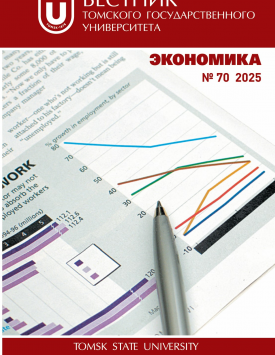Determinants of Russian IT companies' growth and survival at the micro level
The article assesses factors affecting the survival and growth of Russian IT companies at the micro level within a stable economic period (2017-2019) and a period characterized by economic shocks (2020-2022). As a result of the econometric analysis using logistic regressions, it was revealed that intra-firm factors have different impacts on the growth and survival processes of firms, and the influence of factors is different in different economic periods. Thus, the age and size of the company have a multidirectional effect on the survival (positive) and growth (negative) of IT companies. The presence of intangible assets and fixed assets, as well as net profit, is positively associated with the survival and growth of IT companies, but the significance of these factors is higher for the survival of companies. Borrowed funds are critical for the continuation of companies' activities and their growth, especially during times of crisis. Companies registered in large cities grow better, but survive worse, which, on the one hand, is due to access to resources and high demand for their products, and, on the other hand, a highly competitive environment. Also, for survival models in 2020-2022. an increase in a number of coefficients was observed compared to the models for 2017-2019, which emphasizes the importance of such indicators as the availability of fixed assets, intangible assets, net profit and financial resources in the form of borrowed funds to continue the company's operations during the crisis period, while for the growth models in 20202022 compared to 2017-2019, on the contrary, a decrease in the influence of most factors was observed, which indicates that in these economic conditions, other indicators at the regional and national levels as a whole can have a more significant impact on the growth of companies.
Keywords
IT companies,
business demography,
company survival,
company growth,
intra-company indicatorsAuthors
| Ivanova Anastasia I. | Institute of Economics and Industrial Engineering, Siberian Branch of the Russian Academy of Sciences; Novosibirsk State University | a.ivanova2@g.nsu.ru |
| Zubareva Tatyana I. | Vienna University of Economics and Business | tzubarevaa@gmail.com |
Всего: 2
References
Юданов А.Ю. «Быстрые» фирмы и эволюция российской экономики // Вопросы экономики. 2007. № 2. С. 85-100.
Daunfeldt S.-O., Elert N., Johansson, D. Are high-growth firms overrepresented in high-tech industries? // IFN Working Paper. 2015. № 1062. 38 p.
Земцов С.П., Маскаев А.Ф. Быстрорастущие фирмы в России: характеристики и факторы роста // Инновации. 2018. № 6. С. 67-75.
Bogatyreva K., Shirokova G. From Entrepreneurial Aspirations to Founding a Business: The Case of Russian Students // Foresight and STI Governance. 2017. Vol. 11, № 3. P. 25-36.
Земцов С.П. Институты, предпринимательство и региональное развитие в России // Журнал Новой экономической ассоциации. 2020. № 2 (46). С. 168-180.
Cefis E., Marsili O. A matter of life and death: innovation and firm survival // Industrial and Corporate Change. 2005. Vol. 14, № 6. P. 1167-1192.
Coad А., Rao Р. Innovation and firm growth in high-tech sectors: A quantile regression approach // Research Policy. 2008. Vol. 37, № 4. P. 633-648.
Hall B., Moncada-Paterno-Castello P., Montresor S., Vezzani A. Financing constraints, R&D investments and innovative performances: new empirical evidence at the firm level for Europe // Economics of Innovation and New Technology, Taylor & Francis Journals. 2016. Vol. 25, № 3. P. 183-196.
Davidsson P. Entrepreneurial opportunities and the entrepreneurship nexus: A reconceptualization // Journal of Business Venturing. 2015. Vol. 30, № 5. P. 674-695.
Kimjeon J., Davidsson P. External Enablers of Entrepreneurship: A Review and Agenda for Accumulation of Strategically Actionable Knowledge // Entrepreneurship Theory and Practice. 2022. Vol. 46, № 3. P. 643-687.
Nambisan S. Digital entrepreneurship: Toward a digital technology perspective of entrepreneurship // Entrepreneurship Theory and Practice. 2017. Vol. 41, № 6. P. 1029-1055.
Berger E., Briel S., Davidsson P., Kuckertz A. Digital or not - the future of entrepreneurship and innovation // Journal of Business Research. 2021. Vol. 125, № 6-7. P. 436-442.
Steininger D., Brohman M., Block J. Digital Entrepreneurship: What is New if Anything? // Bus Inf Syst Eng. 2022. Vol. 64, № 1. P. 1-14.
Земцов С.П., Чепуренко А.Ю., Баринова В.А., Красносельских А.Н. Новая предпринимательская политика для России после кризиса 2020 года // Вопросы экономики. 2020. № 10. С. 44-67.
Zemtsov S., Chepurenko A., Mikhailov A. Pandemic challenges for the technological startups in the Russian regions // Foresight and STI Governance. 2021. Vol. 15, № 4. P. 61-77.
Образцова О.И., Чепуренко А.Ю. Предпринимательская активность в России и ее межрегиональные различия // Журнал Новой экономической ассоциации. 2020. № 2 (46). С. 198-210.
Баринова В.А., Земцов С.П., Царева Ю.В. Предпринимательство и институты: есть ли связь на региональном уровне в России // Вопросы экономики. 2018. №. 6. С. 92116.
Rossetti F. The Business Demography of the ICT Sector in Europe // JRC Working Papers JRC106589. Joint Research Centre, 2017. 52 p.
Huggins R., Prokop D., Thompson P. Entrepreneurship and the Determinants of Firm Survival within Regions: Human Capital, Growth Motivation and Locational Conditions // Entrepreneurship and Regional Development. 2017. Vol. 29, № 3-4. P. 357-389.
Fritsch M., Wyrwich M. Regional Emergence of Start-Ups in Information Technologies: The Role of Knowledge, Skills and Opportunities // Foresight and STI Governance. 2019. Vol. 13, № 2. P. 62-71.
ЗаздравныхА.В. Детерминанты выживаемости новых компаний обрабатывающей промышленности // Terra Economicus. 2024. Т. 22, № 2. C. 39-59.
Земцов С.П. Технологическое предпринимательство как фактор развития России // Журнал Новой экономической ассоциации. 2022. № 1 (53). С. 212-223.
Иванова А.И., Кравченко Н.А. Влияние региональных условий на бизнес-демографию российских ИТ-компаний // Вопросы экономики. 2022. № 5. С. 79-98.
Kinne J., Resch B. Analysing and Predicting Micro-Location Patterns of Software Firms // ZEW - Centre for European Economic Research Discussion. Paper No. 17-063. 2017. 28 p.
Moeller K. Culturally clustered or in the cloud? How amenities drive firm location decision in Berlin // Journal of Regional Science. 2018. Vol. 58, № 4. P. 728-758.

